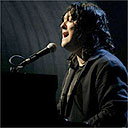A modernist palace of culture built from 130,000 cubic metres of concrete, London’s Barbican Centre is the kind of building you can imagine future civilisations stumbling across like Charlton Heston in Planet of the Apes. The perfect place, then, to be discussing the end of the world. “There’s something broken about us,” says Anohni, sitting in a conference room that’s part of the building she’s set to perform in this July. “We’re behaving in a virulent manner; we’re cannibalising our own home. And we’re unable to stop ourselves.”
Anohni has pondered the apocalypse before with Antony and the Johnsons: “I need another world, this one’s nearly gone,” she sang sadly on Another World, back in 2008. But on new album Hopelessness, her first studio work in more than five years, the trembling ballads of old have made way for lush pop backdrops from Hudson Mohawke and Oneohtrix Point Never. And the lamentation is over: with this record, Anohni is mad as hell, and she’s not going to take it any more. “I haven’t spent a lot of time expressing anger in my life, so this record is a new chapter. Anger is energising: it’s quite an empowering feeling.” She sings of the world we’re living in – one of warfare, sinister technology and rapacious greed that could spin us into oblivion – in order to “support people and determine what’s real”.
Anohni is the new “spirit name” of Antony Hegarty, and the next step in a path to self-definition, from youth in England to college in California and her current life in New York. She has identified as transgender since childhood but “cowardice and shame” prevented her from asking people to call her “she”. “‘She’ used to make my skin crawl,” she says now. “Within a gay context it can be used very snidely: to contain trans people and to denigrate other men. But working and socialising with women, and doing [campaign group] Future Feminism, empowered me in the feminine, and I could accept that it was OK to be the way I am. But I don’t feel emphatically female, it’s more subtle than that.”
At more than 6ft tall, Anohni could easily be lumbering, but she’s delicate, and doodling on a notepad as we talk, she has the quiet, snuffly quality of a child missing school. “I was never going to become a beautiful, passable woman, and I was never going to be a man,” she says. “It’s a quandary. But the trans condition is a beautiful mystery; it’s one of nature’s best ideas. What an incredible impulse, that compels a five-year-old child to tell its parents it isn’t what they think it is. Given just a tiny bit of oxygen, those children can flourish and be such a gift. They give other people licence to explore themselves more deeply, allowing the colours in their own psyche to flourish.”
She has certainly flourished, winning the Mercury prize in 2005 for her album I Am A Bird Now and, this year, becoming only the second transgender person to be nominated for an Oscar, with her song Manta Ray, written for ecology doc Racing Extinction (she boycotted the ceremony after not being asked to perform).
She’s scornful, though, of how politicians have made trans rights flavour of the month: “They realise that it’s not politically advantageous to make scapegoats of trans people, because it’s such a popular Hollywood topic. Meanwhile, evangelicals are trying to hold back reproductive rights.” For Anohni, squabbles about identity are a distraction from the true issues facing us. “Black boys are being killed in the streets by idiotic policemen – it’s so fucking real,” she says. “So it’s not wrong to fight for justice for your special-interest group. But we’ve been deceived into thinking that’s the endgame. You look at those rainbow flag-toting, goggle-eyed gays that think they’ve hit the jackpot now they can have heterosexual privileges. What are they going to say when they’re bobbing in the greenhouse tides? ‘But… I thought we won… I can get married now, I didn’t have anything else to fight for.’ It’s not all about you!”
So what is it all about? We arrive at the second soapbox of the day, as Anohni points out how a small number of Silicon Valley companies have created a giant wealth disparity. “You’re at the Guardian, whose traditional form of income has been rendered obsolete by companies that have manipulatively upstreamed all that money into their pockets,” she says. I blink and think about my pension. “The same thing happened in music. The top end are still making bucketloads, while maintaining the illusion of the American dream: that if you work hard enough you can make a fortune. Meanwhile, the working and middle classes have been hollowed out of the system. A generation of young people don’t expect to make money selling records any more. It’s like boiling a lobster: you turn up the heat slowly enough, so that everyone still thinks it’s their fault that it isn’t working the way it used to work.”
This forced surrender of control is a major preoccupation of Hopelessness. Anohni makes cooing come-ons to a voyeuristic NSA on Watch Me, and on Crisis weeps an apology to those tortured in Guantánamo. She invites ecological destruction on the blockbusting pop single 4 Degrees, with lacerating irony. “We’re not just polluting a river and killing a couple of top predator animals; we’re eradicating the krill, the necessary algae, we’re dismantling the insect and amphibian worlds. We’re going for the building blocks. And we’re never going to be able to replicate it, as arrogantly as scientists believe… it seems like, on a subconscious level, the goal is to eradicate nature and then reintroduce it in dribs and drabs, like a garden of our own design that we can pretend we authored.”
Rather than earnest strumming or punk thrashing the music is, Anohni says, “sugar to the ear – like how a baby tastes sugar and wants more”. She uses the language of pop as a “Trojan horse” to bring big ideas to the masses. So there are trap drums, honeyed ambient effects, Tangfastic synths and billowing productions of candyfloss sweetness – the kind of gorgeous confections that R&B queens covet.
Take the swaying fanfare of Drone Bomb Me (which stars a tearful Naomi Campbell in its video). It would be perfect for Rihanna, except its perspective is of a child whose parents have been killed in drone attacks and who longs to die in the same way. “There’s nothing more confounding to someone who wants to hurt you, than someone who wants to be hurt,” Anohni says. “You cling to their leg so they can’t punch you in the face. It’s a feminine way of dealing with rage and disempowerment.”
On a song called Obama, she is livid with the Potus for authorising these drone strikes. “We desperately hoped he’d manifest the heroic vision that might change America’s course. And how many weeks into office did he sign his first kill list? Even the Nazis had Nuremberg: they had a day in court before they were executed. Bin Laden was executed in his bedroom, and a country celebrated in bloodlust.” She believes that centuries of colonialism are coming home to roost. “Look at Northern Ireland: how many generations does it take to ease the bile that seeps into the blood of a culture? If you kill an innocent person in a far-off country, they’re going to hate you for hundreds of years. And that’s what I’m paying for with my taxes.”
The hate is doubled by the US’s innate aggression. “I love looking at the way that Norway dealt with Anders Breivik,” she says. “They gave him a forum where he could express his demented views, and the country gathered around and identified his illness. In America, though, a misguided teenager participates in a demented activity like the Boston bombing, and they want to tear him limb from limb. I find it amazing that after the Paris attacks, how quickly the French origin of [the culprits] was completely bypassed; they were just ‘towelheads’. Does Europe take responsibility?”
It might read like a stump speech, but all of this is delivered in a chillingly even tone that teeters on resignation. There’s even a note of amusement: the defiant humour of someone on their way to the scaffold. Pessimism further clouds the conference suite as we kick about possible solutions. “We’re still expecting capitalism to solve problems: ‘Maybe if we sell enough oil, we can give some profits to an environmental agency!’ Capitalism isn’t a moral system.” But what if sustainability can be made financially attractive? She bats the idea aside. “The best thing we can do is vote, and meanwhile billions of dollars are being spent to manipulate Americans to vote against their best interests. Look at Trump. All the bankers are thinking: isn’t that fucking brilliant, all the white trash are going to vote for a billionaire.
“As long as poor and middle-class people are looking at their neighbours as the source of their suffering, they’re never going to look at the gated communities,” she continues. “Why did they shut down Occupy so swiftly and so brutally? People for the first time in America were saying: ‘Oh, I always thought it was Democrats versus Republicans, but I suddenly realised it’s 99% against 1%.’ What a revelation, showing Oz behind the curtain, a little man with a megaphone and all this power.”
The world remains unsaved as we walk to the lift, the City of London churning away next to us. But Anohni’s invective against the solipsism of the social media age remains bracing, and her album, she hopes, will help us voice the horror at the world that’s been stuck in our throats. “I am from peasant stock with a shit degree in art – I’m a nothing,” she says. “But it doesn’t take an expert to diagnose the whole stinking system. I talk to a taxi driver from Pakistan and they’re saying the same thing as me. Everyone’s feeling it. David Attenborough’s feeling it; all the people we trust are feeling it. Can we address it? Can we inhale it? Can we withstand it?”
Hopelessness is out 6 May via Rough Trade. Anohni plays New York’s Park Avenue Armory on 18-19 May, Vivid LIVE in Sydney, Australia on 27-31 May and the Barbican Hall, EC2, 7-8 July









